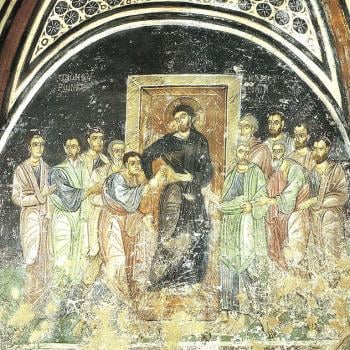
Even when we sin, when we embrace unlove instead of love, that sin leaves us either spiritually wounded or dead. Nonetheless, despite our rejection of love by some act of unlove, God continues to shower us with love and grace, making sure that we can be healed of all the harm we have caused ourselves and rise again from the ashes. God’s love for us is not stopped when we sin; rather, as it is eternal, it is unchanging, but the way we engage that love will differ such that it will seem to become much and much greater the more we find God welcoming us and helping us recover from our sin. God’s love is much greater than the way of unlove, that is, God’s grace is greater than sin and the destruction and annihilation which sin creates in its wake. Sin does not have the final say. Sin does not prevent God from loving us. Sin does not stop God from doing all that can be done on our behalf. With God’s love and grace, we can find and maintain peace. Christ is the prince of peace: he uses a spiritual sword to cut sin (and its corruption) away from us. That is, when Christ talks about using a sword, we must not understand that he wants us to pick up a literal sword and use it for violence, but rather, to use a spiritual sword to overcome discord, breaking down the barriers which sin has created in the world, so that all creation can be brought together in one harmonious accord, the accord which sin destroyed:
For he is our peace, who has made us both one, and has broken down the dividing wall of hostility, by abolishing in his flesh the law of commandments and ordinances, that he might create in himself one new man in place of the two, so making peace, and might reconcile us both to God in one body through the cross, thereby bringing the hostility to an end. And he came and preached peace to you who were far off and peace to those who were near; for through him we both have access in one Spirit to the Father (Eph. 2:14-18 RSV).
Christ, therefore, wields the spiritual sword as if it were a spiritual scalpel, using it to heal us from the contagion of sin and the harm which it has caused us. Those who want to deny the way of peace, those who ignore Christ’s warning that those who live by the sword will die by it, want to turn Christ into some sort of warrior, one who comes to conquer the world through violence. They want us to forget that Christ is called the prince of peace – Jesus, himself, does not deny he brings us peace, indeed, he says he brings it, but as is usual with him, he often presents us the way he does this in an enigmatic, almost paradoxical way. Those who do not understand the way Jesus speaks, and so try to take literally what is a metaphor, undermine Christ and his accomplishments as they try to use him to serve the way of destruction. They think the Christian faith should serve as a tool for their wanton violence and the domination and control they want to set up through it. That is, they want Christ to follow the way of sin, to have Christians follow the way of sin, instead of the way of love.
Christ calls us to the way of peace. We are expected to come to him, seeking peace for ourselves; in order to attain that peace within, we must also work for peace throughout the world. We are to join ourselves, therefore, to Christ and his mission, and, though history shows that even in the church, this is often undermined, eschatologically, the church is where that peace will be established as the whole world will find themselves to be one in and through it (and so, one with Christ, as the church is the body of Christ):
So then you are no longer strangers and sojourners, but you are fellow citizens with the saints and members of the household of God, built upon the foundation of the apostles and prophets, Christ Jesus himself being the cornerstone, in whom the whole structure is joined together and grows into a holy temple in the Lord; in whom you also are built into it for a dwelling place of God in the Spirit (Eph. 2:19-22 RSV).
We rise out of our spiritual death and we are brought back to spiritual life in and through Christ. This is because we see Christ has taken us into himself, so that we become one with him, a part of his mystical body, which is why we are called to share in his work as prince of peace. We are to do what we can to build up a true peace in ourselves and in the world around us. It must, of course, be a just peace, one which restores the rights and dignity of those who have lost either of them. Tyranny and abuse have no place with the peace of Christ. We must, therefore, wield the spiritual sword with Christ, cutting away injustice in the world, and the sin which led to and created it. We are to use it to overturn systems of abuse and the structures of sin which keep them in place. The work for peace rejects the way of sin, the way of violence, but it does not reject the need to struggle against sin, against injustice in the world – it is not apathetic, it does not give in to injustice, but rather, it resists such injustice as long as is necessary. Peace building must be done in the proper fashion. It must embrace healing, not vengeance, lest the peace which is established proves to be unjust and so helps reinforce the structures of sin (in a new way). Thus, all the healing which Jesus did in his ministry itself was a representation of the way of peace, the way he worked to establish peace in the world, showing us how much greater the way of grace is to the way of violence and the injustice which follows it. Let us, therefore, embrace the work of peace in the world.
Stay in touch! Like A Little Bit of Nothing on Facebook.
If you liked what you read, please consider sharing it with your friends and family!
N.B.: While I read comments to moderate them, I rarely respond to them. If I don’t respond to your comment directly, don’t assume I am unthankful for it. I appreciate it. But I want readers to feel free to ask questions, and hopefully, dialogue with each other. I have shared what I wanted to say, though some responses will get a brief reply by me, or, if I find it interesting and something I can engage fully, as the foundation for another post. I have had many posts inspired or improved upon thanks to my readers.













